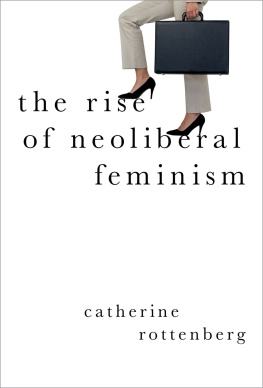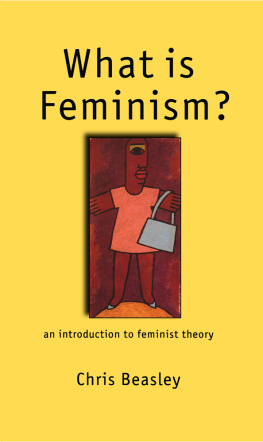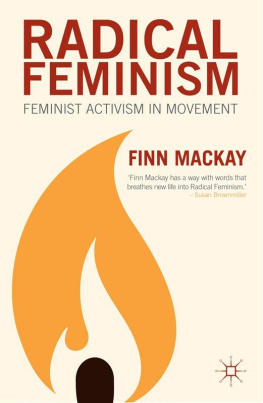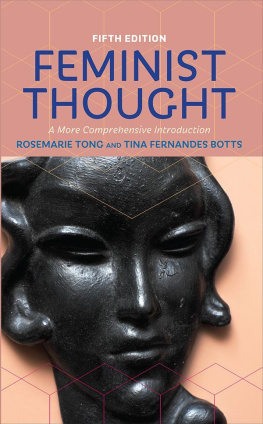THE RISE OF NEOLIBERAL FEMINISM

HERETICAL THOUGHT
Series editor: Ruth OBrien, The Graduate Center, City University of New York
Assembly
Michael Hardt and Antonio Negri

Oxford University Press is a department of the University of Oxford. It furthers the Universitys objective of excellence in research, scholarship, and education by publishing worldwide. Oxford is a registered trade mark of Oxford University Press in the UK and certain other countries.
Published in the United States of America by Oxford University Press
198 Madison Avenue, New York, NY 10016, United States of America.
Oxford University Press 2018
All rights reserved. No part of this publication may be reproduced, stored in a retrieval system, or transmitted, in any form or by any means, without the prior permission in writing of Oxford University Press, or as expressly permitted by law, by license, or under terms agreed with the appropriate reproduction rights organization. Inquiries concerning reproduction outside the scope of the above should be sent to the Rights Department, Oxford University Press, at the address above.
You must not circulate this work in any other form and you must impose this same condition on any acquirer.
Library of Congress Cataloging-in-Publication Data
Names: Rottenberg, Catherine, author.
Title: The rise of neoliberal feminism / Catherine Rottenberg.
Description: New York : Oxford University Press, [2018] | Series: Heretical
thought | Includes bibliographical references and index.
Identifiers: LCCN 2018005396 (print) | LCCN 2018012225 (ebook) |
ISBN 9780190901233 (Updf) | ISBN 9780190901240 (Epub) |
ISBN 9780190901226 (hardcover : alk. paper)
Subjects: LCSH: Feminism. | Neoliberalism.
Classification: LCC HQ1155 (ebook) | LCC HQ1155 .R687 2018 (print) |
DDC 305.42dc23
LC record available at https://lccn.loc.gov/2018005396
To Ari and Avivi, my wilde khayes
CONTENTS
In recent years, feminism has seen a resurgence in the popular media, with celebrities proudly declaring themselves feminists and bestselling books teaching women how to shatter the glass ceiling without neglecting their families. In this book, however, Catherine Rottenberg shows us how such neoliberal feminism forsakes the vitally important goals of emancipation and social justice, substitutes positive affect for genuine change, and adopts the theory and often the very language of neoliberalismwhich, in turn, needs feminism in order to resolve its own internal contradictions. With passion and rigor, Rottenberg reveals that neoliberal feminism is not a philosophy but rather a self-help program for upper-middle-class women, one that leaves behind those who do not fit the template of a privileged professional.
She begins by mercilessly dismantling neoliberal feminisms preoccupation with maintaining balance between family and career. Rottenberg shows how this focus on the self dovetails with neoliberal rationality, particularly in its emphasis on the individuals cost-benefit calculus of personal fulfillment (which relies on low-paid, outsourced care work to make the numbers come out right). Instead of benefiting all women, neoliberal feminism divides women into aspirational and non-aspirational cohorts, with different roles and expectations for the two groups.
Rottenberg carries this provocative analysis further with her counterintuitive exposure of the way neoliberalism needs feminism. In neoliberal rationalism, people are human capital consisting of ungendered productive unitsyet for the neoliberal system to be sustainable, women must also play a reproductive role by creating future workers. To resolve this contradiction, she argues, neoliberalism embraces a new technology of the self structured through futurity, which encourages women to postpone maternity (notably by freezing eggs) until a time when it will interfere less with their productive capacity. The popularity of neoliberal-feminist books by women from across the political spectrum shows how widespread approval of this brand of feminism is.
In detailing the deficiencies of neoliberal feminism, and the fissures within the feminist movement that its rise has accentuated, Rottenberg eschews any calls for unification based on compromise, accommodation, or commonly agreed-upon goals. Instead, she advocates alternative feminist visions [that] not only challenge but also constitute a profound threat to our contemporary neoliberal order. Indeed, given our grim and frightening reality, it is precisely such a threatening feminism that we need to cultivate, encourage, and ceaselessly espouse. She concludes by invoking Judith Butlers concept of precarity as a unifying factornot only for women, but for all who are marginalized or who struggle for social justice. With the times ripe for converting neoliberal feminism into a more vigorous and inclusive ideology, women can turn around the unfortunate mutual entanglement of neoliberalism with feminismand subvert neoliberalism by killing it from within.
Like all works that challenge convenient untruths, this book will disturb some readers and ruffle some feathers. By disputing a widespread notion of what feminism is; by elucidating the insidious ubiquity of neoliberal thought; by demanding that we pay attention to the oppressed and marginalized; and by paradoxically finding hope in the current dark times, Catherine Rottenberg gives us the hard truth, takes us to the edge of a cliff, and then maps the way back. For all these reasons, her book makes an outstanding addition to the Heretical Thought series.
Professor Ruth OBrien,
The Graduate Center, CUNY
LIKE MOST RESEARCH, THIS PROJECT has multiple roots and many people have cultivated its growth over the years. The first seeds were sown when I was a visiting scholar at the Institute for Advanced Study in Princeton, where I met Joan Scott and Sara Farris and where we began a three-way conversation about feminism. I am intensely grateful to Joanshe is a fiercely unique feminist force, and she continues to inspire me at every single turn. Sara has been a kindred spirit in this long journey. Her support, intellectual perspicacity, and friendship have been a mainstay during these past years. She has read and commented on almost every line in this book. Not only has her feedback been invaluable but her economic critique has changed the way that I see and understand the world.
That year at the Institute for Advanced Study was a truly formative onein large part because of the wonderful new friendships forged. One new and precious relationship is with David Eng, to whom I am grateful for all of his unwavering support, his amazing work, and his crucial feedback, as well as the many conversations that helped me think through my arguments. Many thanks also go to Moon-Kie Jung for his incisive comments as well as his honesty and dry humor. Peter Thomas, Nicola Perugini, Farah Salah, and Teemu Ruskola have also become dear friends and important interlocutors in my life. Thank you all. A special thank you goes to Zia Mann, who was instrumental in igniting my desire to research the notion of work-family balance, as well as to Lila Berman, who kept sending me crucial material. Lila also offered me extremely insightful comments, and I am grateful to her in more ways than one.











